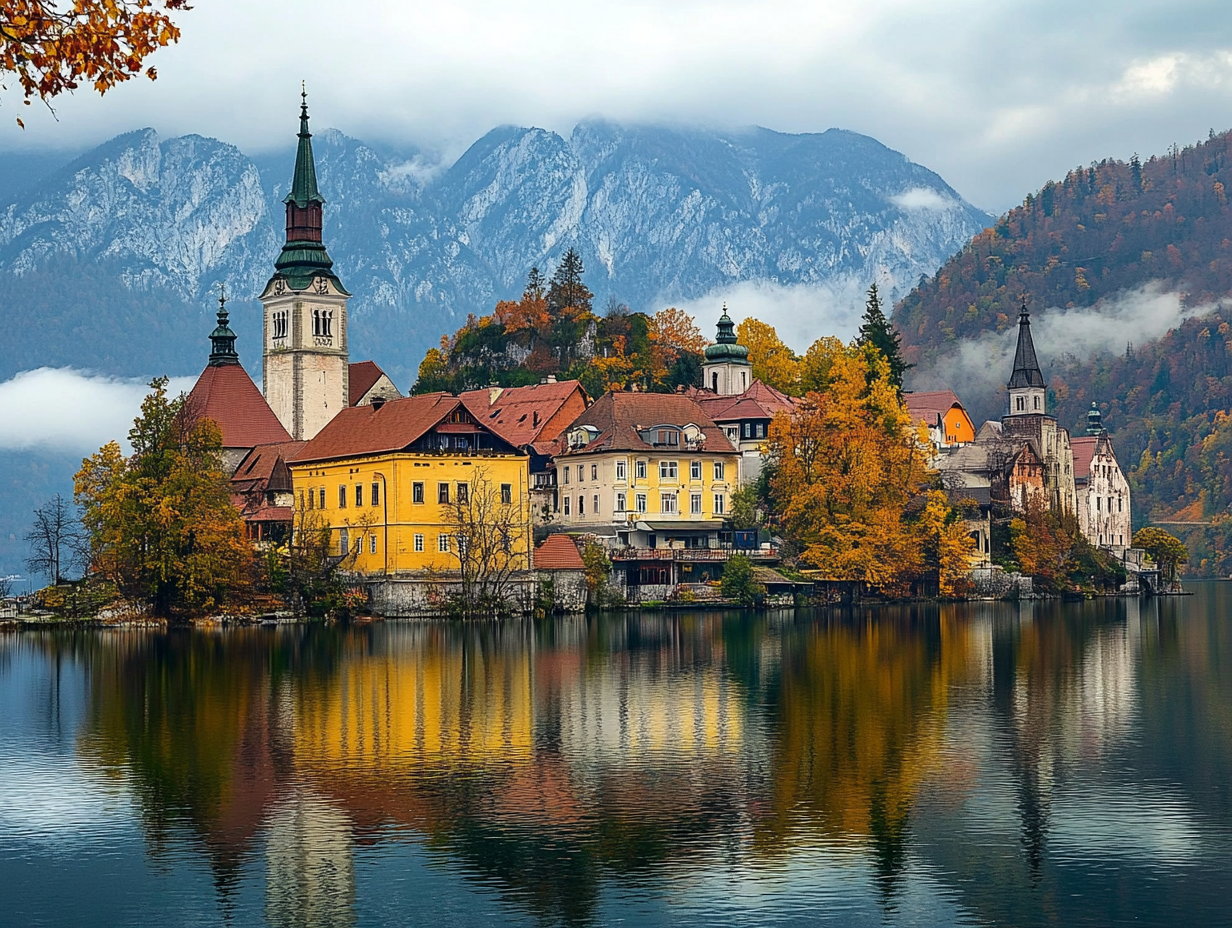The true luxury of these 10 affordable destinations isn’t just in what you spend, but in the freedom from financial stress that allows you to say “yes” to unexpected adventures, authentic local experiences, and that extra helping of street food you didn’t need but deserved.
In a world where inflation seems determined to turn your travel dreams into financial nightmares, a select group of destinations continues to offer sanctuary for the budget-conscious explorer.
While your friends post photos captioned “selling a kidney to fund day 3 days in Switzerland,” you could be uploading images of sumptuous street food feasts, breathtaking landscapes, and cultural treasures that cost less than their morning latte.
Welcome to the magical realm of budget travel in 2025, where adventure doesn’t require a trust fund and your bank account might return from vacation with you.
Budget Calculation Breakdown
These daily budget figures represent the typical costs a budget-conscious traveller might expect to spend each day. The calculations include-
- Basic but comfortable accommodations (guesthouses, hostels, or budget hotels)
- Three meals, including some street food and local restaurants
- Public transportation within the country
- Entrance fees to key attractions
International flights to reach these destinations are not included—consider those your separate investment in affordable adventure.
1. Laos – Average Daily Budget: $15
Leading our parade of affordability is Laos, the landlocked Southeast Asian nation where $15 daily buys a travel experience rich in culture and natural beauty. This Buddhist country offers some of Asia’s most pristine landscapes at prices that seem like they’ve time-traveled from the 1990s.
In Luang Prabang, a UNESCO World Heritage site, comfortable guesthouses can be found for $5-7 per night, while a bowl of traditional khao soi noodles costs barely $1.50. The country’s transportation network, though sometimes slow, remains incredibly affordable.
What makes Laos so affordable is its still-developing tourism infrastructure combined with a predominantly rural economy.
The Laotian kip’s relatively weak position against major currencies further stretches the traveller’s budget, creating a paradise for those seeking authentic experiences without financial strain.
2. Kazakhstan – Average Daily Budget: $19
The world’s 9th-largest country offers an astonishing array of experiences for just $19 daily. Kazakhstan’s combination of vast steppes, soaring mountains, and modern cities presents a diverse adventure playground at prices that seem disconnected from global inflation.
In Almaty, the country’s cultural capital, hostels and budget hotels start around $8-10 per night, while hearty meals of beshbarmak (national dish of meat and noodles) or plov (rice pilaf) cost $2-4 at local eateries. Public transportation remains a particular bargain!
Kazakhstan’s affordability stems from its resource-rich economy that hasn’t yet translated into tourism price inflation, plus significant government investment in infrastructure without corresponding tax burdens on visitors.
3. Rwanda – Average Daily Budget: $21
Known as “The Land of a Thousand Hills,” Rwanda offers remarkable experiences for $21 daily. This East African nation has transformed itself into one of the continent’s safest and cleanest destinations while maintaining budget-friendly pricing for everyday travellers.
Basic but clean accommodations in the capital, Kigali, start around $10 nightly, while local restaurants serve substantial plates of grilled meats, beans, and plantains for $2-4.
The country’s excellent public transportation system includes motorcycle taxis and an extensive bus network connecting major attractions for minimal cost.
Rwanda’s affordability comes with some health considerations—travellers should take precautions against mosquito-borne diseases—but the country’s remarkable development story includes universal healthcare access that benefits visitors through clean conditions and improved sanitation nationwide.
4. Ghana – Average Daily Budget: $22
West Africa’s stable democratic star offers cultural richness and Atlantic coastlines for just $22 daily. Ghana combines historical significance as the first sub-Saharan African country to gain independence.
In Accra, the energetic capital, budget accommodations start around $8-12 nightly, while street food staples like jollof rice, waakye (rice and beans), and kelewele (spiced plantains) cost $1-3 per portion.
The country’s tro-tro minibus network connects towns and attractions for minimal fares, while entrance to historical sites like Cape Coast Castle typically costs $5-10.
Ghana’s affordability comes with tropical considerations—mosquito protection is essential—but the country’s relatively developed infrastructure and political stability create a comfortable environment for budget travellers.
5. Mongolia – Average Daily Budget: $24
The land of Genghis Khan and endless steppes offers nomadic adventures for $24 daily. Mongolia, with the world’s lowest population density, provides genuine wilderness experiences at prices that defy global tourism trends.
In Ulaanbaatar, the capital where nearly half the population lives, hostels and guesthouses start around $8-10 nightly, while meals of buuz (steamed dumplings) or khorkhog (traditional barbecue) cost $3-5 at local establishments.
Mongolia’s extreme seasonality contributes to its affordability—summer visitors benefit from perfect conditions, while brave winter travellers encounter even lower prices during the -40°F cold season.
The country’s nascent tourism industry means authentic experiences haven’t yet been commodified and priced accordingly, creating exceptional value for adventurous travellers.
6. Armenia – Average Daily Budget: $26
This Caucasus nation packs extraordinary cultural heritage and dramatic landscapes into a country smaller than Maryland, all accessible for $26 daily. Armenia’s 3,000 years of history include early Christian heritage, Soviet-era remnants, and distinctive cuisine that rivals more expensive European destinations.
In Yerevan, the pink-stone capital, budget accommodations start around $10-15 nightly, while restaurant meals featuring local specialities like khorovats (barbecue) or dolma (stuffed vegetables) cost $4-7. The country’s compact size makes transportation affordable!
Armenia’s economic positioning between Europe and Asia creates a sweet spot for travellers—European-influenced infrastructure at Asian price points.
The country’s ongoing development following the Soviet collapse means tourism services improve annually without corresponding price increases, creating excellent value for cultural travellers.
7. Burkina Faso – Average Daily Budget: $26
Tied with Armenia at $26 daily, this West African nation offers authentic cultural experiences largely untouched by mass tourism. Burkina Faso’s rich artistic traditions, distinctive mud architecture, and vibrant festivals provide unforgettable experiences at minimal cost.
In Ouagadougou, the capital, basic guesthouses start around $8-12 nightly, while street food and local restaurants serve substantial meals for $2-4. Transportation options include shared taxis between towns ($3-8 for longer journeys) and bicycle rentals ($2-3 daily) for exploring local areas.
Burkina Faso’s affordability comes with infrastructure challenges that require additional planning but reward flexible travellers with genuine connections.
While security considerations exist in certain border regions, most tourist areas remain accessible and affordable due to the country’s position outside mainstream tourism circuits.
8. Georgia – Average Daily Budget: $28
Not the American state but the Caucasian country, Georgia, offers a Mediterranean climate, breathtaking mountains, and 8,000 years of winemaking tradition for $28 daily.
In Tbilisi, the charismatic capital, hostels and guesthouses start around $10-15 nightly, while traditional restaurants serve khachapuri (cheese bread), khinkali (dumplings), and other local specialities for $5-8 per feast-like meal.
The country’s modern transportation network includes a metro system and marshrutkas connecting major destinations for $3-8.
Georgia’s affordability stems from its strategic positioning outside the Eurozone while maintaining European standards.
9. Mali – Average Daily Budget: $29
This West African nation offers access to legendary destinations like Timbuktu and the Niger River for $29 daily. Mali’s combination of ancient civilisations, distinctive mud architecture, and vibrant musical traditions creates extraordinary cultural experiences on a minimal budget.
In Bamako, the riverside capital, basic accommodations start around $10-15 nightly, while local restaurants serve dishes like tigadegena (peanut stew) or capitaine (Nile perch) for $3-5. Transportation includes shared taxis ($2-5 for city journeys) and regional buses connecting major destinations like Mopti and Ségou.
Mali’s position outside mainstream tourism circuits contributes to its affordability, though travellers should note that security considerations restrict access to certain regions.
10. Burma (Myanmar) – Average Daily Budget: $34
Rounding out our list at $34 daily is Burma, where ancient temples, floating gardens, and traditional villages create unforgettable experiences without breaking the bank. This Southeast Asian nation offers cultural riches comparable to Thailand at a fraction of the cost.
In Yangon, the former capital, budget accommodations start around $15-20 nightly, while traditional teahouses serve mohinga (fish noodle soup) and other local specialities for $1-3. Transportation options include the circular train around Yangon and overnight buses connecting major destinations for $10-15.
Burma’s complex political situation has slowed tourism development, creating an unusual situation where infrastructure sometimes lags while prices remain exceptionally low.
Bottom Line
As your flight touches down back home after exploring these budget-friendly destinations, you might notice something unusual—your credit card isn’t sobbing in the corner of your wallet.
Instead of vacation debt that requires a payment plan with more instalments than your country has states, you return with memories, photos, and possibly even some unspent currency.
The true luxury of these affordable destinations isn’t just in what you spend, but in the freedom from financial stress that allows you to say “yes” to unexpected adventures, authentic local experiences, and that extra helping of street food you didn’t need but deserved.
After all, the best souvenir isn’t the trinket that collects dust on your shelf—it’s returning home with stories that didn’t cost your financial future to collect.



